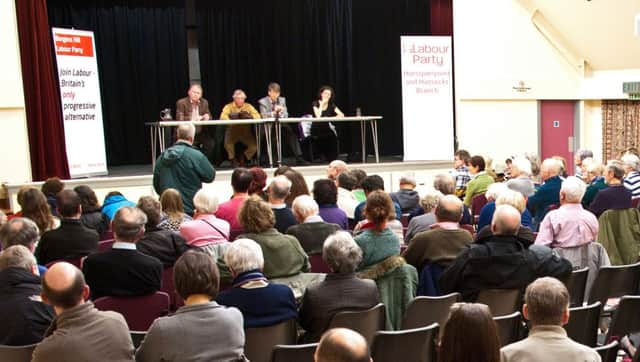Fracking: “Helpful or harmful?” - public debate in Hassocks packed out


The debate was led by Balcombe’s Professor Alan Rew (sceptic), Nick Grealy, a leading advocate of shale gas (Kingston upon Thames) and Labour MEP candidate Anneliese Dodds from Oxford, promoting her party’s case for stricter regulation.
Half of the evening was devoted to a forthright expression of views and questions from the audience.
Advertisement
Hide AdAdvertisement
Hide AdThere was no doubt that interpretations of the evidence on either side of the controversy were passionately held.
Steve Lewis, chair of Hurstpierpoint and Hassocks Labour Party, which, with Mid Sussex Constituency Labour Party, had organised the public meeting, can rarely have had a meeting to chair with emotions running so high, but he ensured that as many people as possible were able to get their views and questions heard.
Alan Rew deplored what he described as the ‘ideologically driven’ pro-fracking agenda of the Coalition Government, accompanied by an ‘exaggerated’ account of its benefits from ministers. Fracking’s ‘soothsayers’, he continued, claiming that wells would stay safe, ignored evidence that 30% of them failed, causing potentially dangerous leaks, within ten years.
Not so, Nick Grealy replied, claiming that the great majority of the 80 world-wide investigations of fracking on his website - www.nohotair.co.uk - uphold the view that the technique is safe and yields gas that reduces fuel bills (as in the USA).
Advertisement
Hide AdAdvertisement
Hide AdSome listeners vehemently challenged Nick when he went on to state that this ‘money coming up from the ground’ could provide Government tax revenues to fund more NHS staff and other spending demanded by many of fracking’s opponents.
Moreover, he maintained, to more protestations from the floor, at Balcombe conventional oil exploration, not shale gas fracking, was being undertaken by Cuadrilla.
Anneliese Dodds - who invites queries and proposals on fracking via her website www.anneliesedodds.org.uk - endorsed ‘six strong regulatory safeguards’ that Labour - ‘not opposed in principle’ to fracking - would introduce to prevent over-hasty use of the relatively new type of fracking.
To illustrate this she cited the suspension of drilling in Lancashire in 2011 when seismic activity was experienced.
Advertisement
Hide AdAdvertisement
Hide AdThese safeguards, she said, would end ‘a lack of transparency and control’ as in the USA.
They involved 12 months monitoring before exploration could commence.
Some listeners expressed strong doubts on whether some of the new safeguards would work, such as assuring ‘the integrity of each shale gas well’.
One such doubter, Brenda Pollack of Friends of the Earth, describing fracking as an unnecessary, unwanted ‘gamble’ that wouldn’t reduce energy bills, called instead for more resources to develop sustainable energy sources.
Advertisement
Hide AdAdvertisement
Hide AdAlan Rew and Anneliese Dodds, questioned after the meeting, said they would favour a fracking moratorium, but Nick Grealy thought it ‘pointless’ in view of what he believes is overwhelming evidence for the technique’s safety and economic benefits.
What do you think? Leave a comment below, or email Letters to the Editor to [email protected]